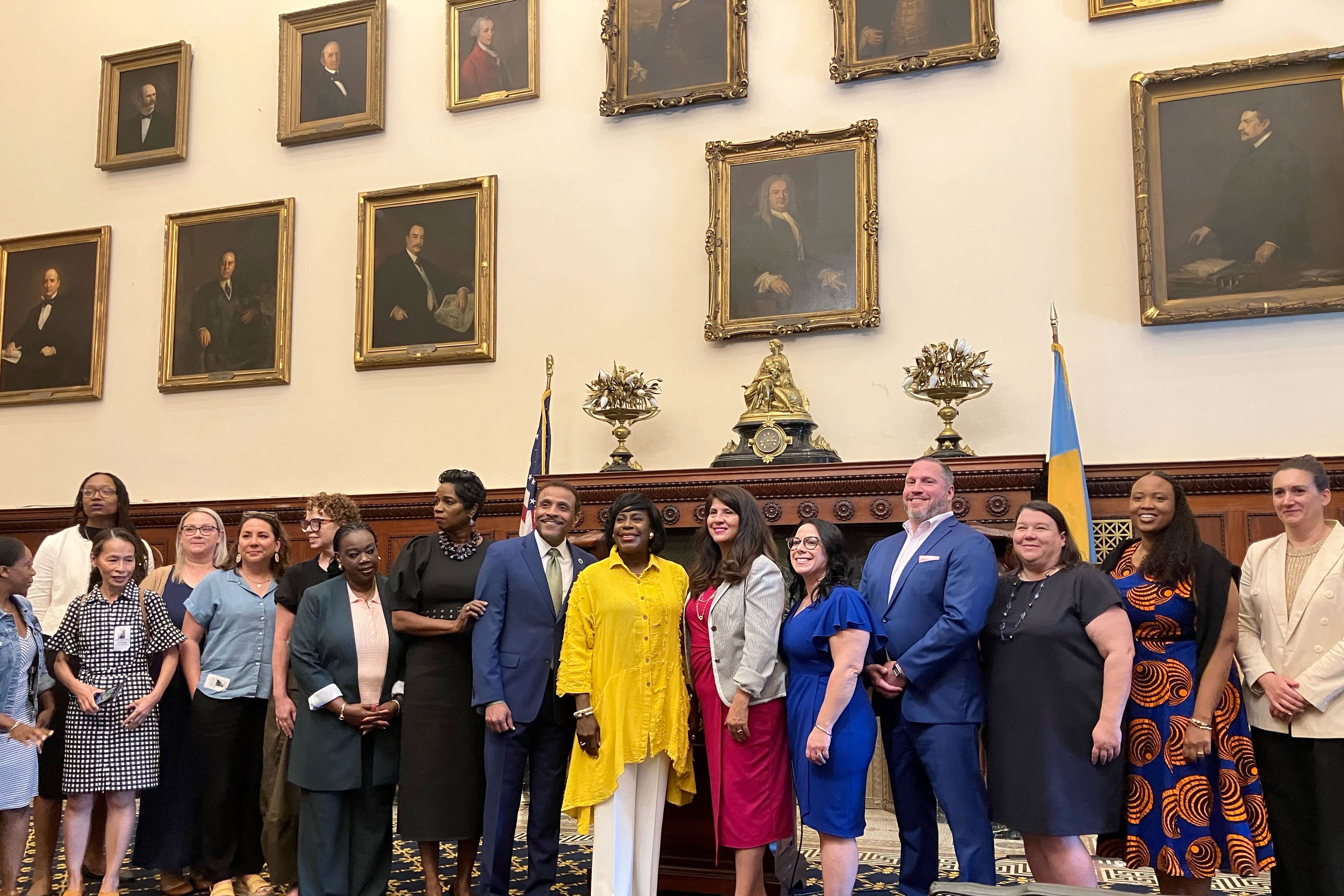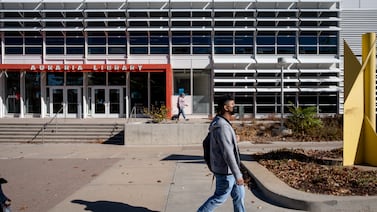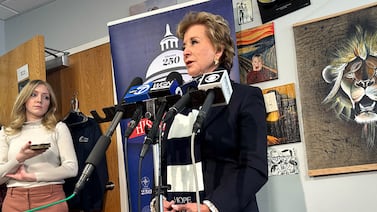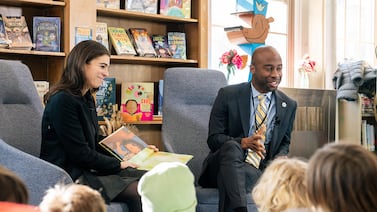Sign up for Chalkbeat Philadelphia’s free newsletter to keep up with the city’s public school system.
Philadelphia Mayor Cherelle Parker is very clear about what year-round schooling won’t be when it launches as a pilot for students in grades K-8 in 25 schools this fall.
There won’t be any changes to the academic calendar. It won’t be mandatory. Parents will not have to fill out an application. There won’t be any changes to union collective bargaining agreements or requirements for educators to teach outside of their contracted schedules. Existing before- and after-care services provided by community partners will also continue.
So what’s new about Parker’s signature education initiative? Not much, for now. But on Thursday, the district and the city did take a step forward by revealing which Philadelphia public schools will be part of the pilot.
At a City Hall press conference announcing what the mayor’s office is calling the “extended day, extended year program,” Parker, Superintendent Tony Watlington, and Chief Education Officer Debora Carrera said parents and teachers won’t see much difference during phase one of year-round school rollout which is set to begin when school starts this August.
“The first pilot year will be a learning year,” Parker said. “We want to make sure that there are no excuses: That our children in the Philadelphia school district, regardless of their socioeconomic status and what ZIP code, they get access to high-quality enrichment programs that are not traditionally offered during the school day.”
The 25 schools in the pilot — 20 traditional district schools and five charter schools — were chosen by district and city officials mostly because they are already delivering the type of substantial out-of-school-time programming, social-emotional enrichment, and academic programming that Parker said she hopes other city schools will provide in future phases of the initiative.
Crucially, those schools are among the few in the city that have air conditioning and can keep kids cool in the summer. Ten of the 25 schools are known as “community schools” that connect families with social services and some health care options.
Carrera also said the selected schools were “located in communities where children are at high risk of involvement in the child welfare or juvenile justice system.”
One notable change that will affect parents and others: The pilot school buildings will remain open between 7:30 a.m. and 6 p.m five days a week, even on half-day schedules. They will offer optional “specialized enrichment” before and after the traditional school day, as well as during the winter, spring, and summer break periods. (Some of the pilot schools were already staffing their buildings in some capacity during breaks.)
Parker’s announcement about the pilot, which was preempted by a Philadelphia Inquirer report this week, led to some backlash. Some surprised parents and teachers took to social media to express their disappointment that the news leaked early before parents and others involved in the pilot schools heard directly from officials.
Carrera said Thursday that the first year of the initiative will involve gathering feedback from parents, teachers, and students to continue to tweak and improve on the model.
“This is about deepening enrichment opportunities as we build, as we listen, and as we work,” Carrera said.
The total cost for year-round schooling, and how to staff it, continue to be areas of uncertainty for Parker’s plans.
The Philadelphia Board of Education will vote Thursday evening on a $20 million contract with the Boys & Girls Club, Girl Scouts of America, Sunrise of Philadelphia, Philadelphia Youth Network, and others to run out-of-school-time programs at the 25 pilot schools. The schools have been using federal COVID relief money to fund their before- and after-care programs, which are mostly operated by community partners and nonprofit organizations.
But that relief money will expire this year, jeopardizing the programs’ future.
The $20 million would keep those programs in place as part of the year-round school initiative. The city’s newly approved budget for next year also includes an increase in the school district’s share of property tax revenue that could help pay for the initiative. The district’s state funding could also increase soon..
Parker was also adamant on Thursday that no educators would be forced to participate and no union contracts would be violated by her proposal. But an ongoing teacher shortage in the district raises questions about who will be providing these academic enrichment opportunities outside of school hours.
Asked how these programs would be staffed if not by certified Philadelphia teachers through their contracts, Parker demurred. She said teachers who “want to participate” could do so.
“We are working very closely with our unions,” Watlington said.
Arthur Steinberg, the president-elect of the Philadelphia Federation of Teachers, said in a statement Thursday that it is “accurate that the pilot program will not affect contractual obligations in the coming school year. However, any new [district] program that could potentially require changes to the school calendar must be negotiated. Our members await and expect more detailed information about the pilot and potential implications for the next negotiated contract.”
The 20 traditional district schools in the pilot are:
- Add B. Anderson Elementary
- Carnell Elementary
- Cramp Elementary
- Farrell Elementary
- F.S. Edmonds Elementary
- Gideon Elementary
- Gompers Elementary
- Greenberg Elementary
- G.W. Childs Elementary
- Juniata Park Academy
- Locke Elementary
- Morton Elementary
- Overbrook Educational Center
- T.M. Peirce Elementary
- Pennell Elementary
- Solis-Cohen Elementary
- Southwark Elementary
- Vare-Washington Elementary
- Webster Elementary
- Richard Wright Elementary
The five charter schools in the pilot are:
- Belmont Charter School, which already operates its own year-round program.
- Northwood Charter School
- Pan American Charter School
- Mastery Pickett (in grades 6-8 only)
- Universal Creighton Charter School
Carly Sitrin is the bureau chief for Chalkbeat Philadelphia. Contact Carly at csitrin@chalkbeat.org.







